
Tenaya
September
2013
Part Three
Mal Island
Ninigo Atoll, PNG
| |
| HOME |
| About Tenaya |
| About Us |
| Latest Update |
| Logs from Current Year |
| Logs from Previous Years |
| Katie's View |
| Route Map |
| Links |
| Contact Us |
![]()
September 30, 2013
01 23'.84S 144 11'.58E
"Be sure you put out plenty of chain," Thomas cautions, "boats have..." and he motions with a slow sweep of his arm. Got it, someone dragged here. Our anchor has just settled on the sand when he, Clement, Pewin and two boys, Silvester and Paul, arrive in a banana boat to welcome us to Ninigo Atoll. We put out 7:1 scope, back down, make sure we are well set and breathe a sigh of relief. There are no looming reefs.
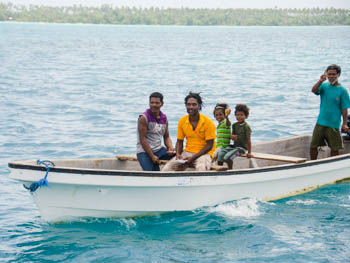

The group climbs aboard and we give them a tour. The sea bunks are still made and pillows, pareaus and sheets are tossed about but our guests don't care. Speaking softly and looking intently into our eyes, Thomas assures us that Mal is a safe place. The people may offer to give us things but we are not to percieve that as trading. They do not trade here. I make a mental note: gift-giving, not trading.
Ninigo does not get many foreign visitors. We are the fourth yacht this year. There is a landing strip that is seldom used, only for medical emergencies and when officals come from far away.
Thomas has brought out the island guest book. Sarah and her family on Anui made it two years ago. We thumb through and see Totem's entry from last year. Another boat has just left that spent almost a year here. Thomas leaves the book with us to read and make our own entry.
He invites us to his village, Puhipi, and to nearby Piakahu where Pewin is living temporarily with his family. We agree to visit the following day. Today Jim will be busy replacing the alternator. It died on the overnighter from Hermit.
It is not an easy fix. The new alternator has a different pully so Jim must pry the original off and put it on the replacement. It is stuck fast. With me holding a metal bar to keep the hex key in place from one side of the engine, Jim loosens it with a box wrench and a lot of force from the other side. There is no way we could have done this underway.
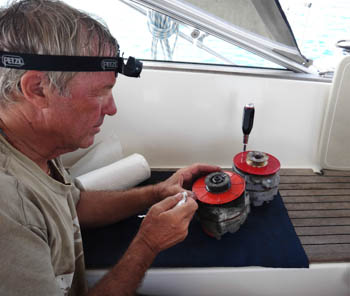
"Letu solian," Thomas greets us as he wades out in the shallow water to take our painter. He introduces us to his extended family and gives us a tour of the village. Before we leave for the day he lends us a Seimat-English dictionary to scan. Unlike the people in Hermit Islands who have lost their local language, the folks in Ninigo are proud of their native tongue.
Across the island from Puhipi, about 100 meters away, the beach is littered with driftwood and other things that wash up from who knows where. Every once in a while a treasure appears like a log suitable for the hull of a sailing canoe or a solar powered, GPS trackable buoy. These escape their Asian fishing nets and float free until an island gets in the way. If the island is inhabited, some lucky local has a new waterproof rechargable battery.


We watch Clement, one of Thomas' brothers, weaving sago leaves to repair his house. We meet Thomas' wife, Elizabeth, son Richard and his wife, Edith and their kids Thomas and Samantha. We also meet his brother and sister-in-law, Joseph and Marianne and their kids, Judy, Jones and Floride. Judy has a new baby named Elizabeth. I do not have a marvelous memory so I write all of this down. While I do, Judy gives me a pumpkin. I don't even notice the pig lying under the table.
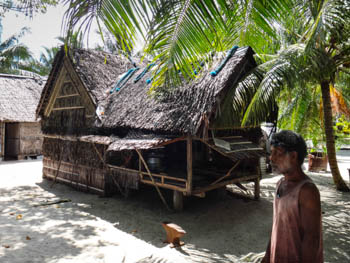

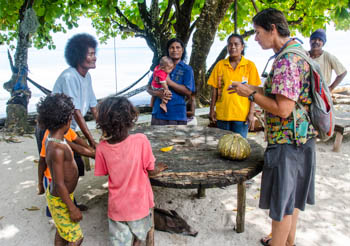
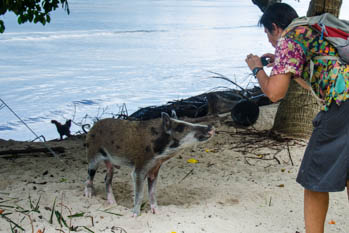
Piakahu Village is at the far end of the island. A wide but barely maintained track through the bush is riddled with crab holes as wide as coconuts. I never look up for fear of twisting an ankle or stepping on a sideways scurrying inhabitant.
It takes 30 minutes to walk to this village where Mollina and Westley live with their young son. I give Mollina letters and photos from their friends Sarah on Anui and Behan on Totem. She is overjoyed and reads them at once.
Mollina tells me the story. She was pregnant when Sarah, Scott, Seth and Finn visited Ninigo on Anui. As they talked one day, Sarah put her hand on Mollina's belly and said, "If your baby is a boy you will name him Finn." It was and she did.
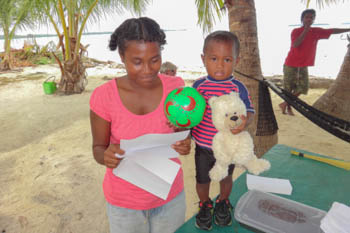
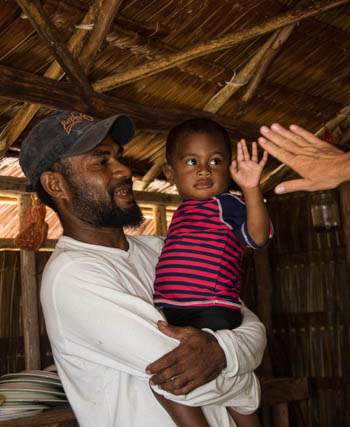
Baby Niall was born one month ago and Mollina suggested her brother and sister-in-law, Pewin and Paulyn, name him Niall after the boy on Totem. She remembers Niall making the long walk to their village by himself just to visit. As Pewin cuddles his newborn, he tells us how proud he is to have a unique name for his son and how he hopes the two Nialls will meet while his eyes are still blinking. That means before he dies.
"Where did you have him," I ask Paulyn, "at home or at a hospital?" Everyone chuckles. "This is a funny story" she says. "We were in the boat going to the hospital and we ran out of zoom. So we were paddling. And I had him. There in the boat! I wrapped him in a blanket and held him while Pewin and Sheddy paddled. Bevlyn, our first born, was there. Four of us, then five. I carried him to the hospital." The hospital is at the opposite end of the long, horseshoe shaped island. "He is Ocean Boy," Pewin says smiling broadly, "just like American Niall."
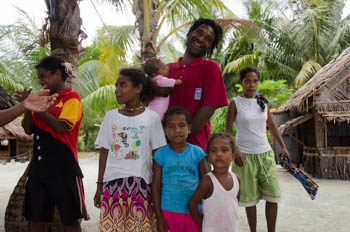

Mollina and Paulyn teach me to make coconut oil in the kitchen Westley has recently built. They explain that there are two kinds of coconut oil - fresh and overnight. Fresh is better as the coconut is scraped and cooked at once. Coconut oil can be used to heal wounds as well as for cooking.
To save time they have already grated six coconuts. Westley shows me the stool used to scrape the flesh out and I tell them about my shell scraper that Blaise made me in Kavieng. They've never heard of one but show me their other grater. It's like the one in my galley on steroids. Made from curved galvanized steel with wooden handles, it has holes punched through with nails. Ingenious and effective.
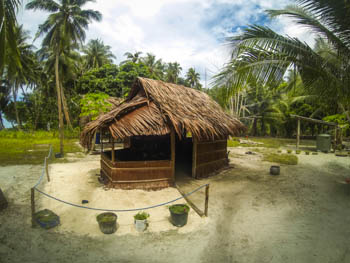
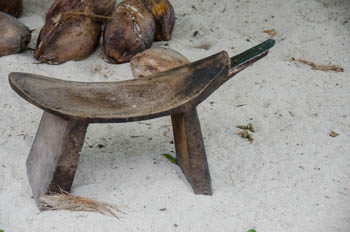
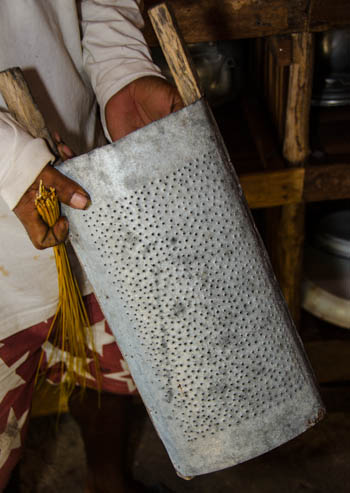
While Jim swings in a hammock tied between palm trees chillin' with the guys, Mollina, Paulyn and I squeeze the milk out of the coconut shavings. We squish and sqeeze over a strainer into a big pot. The pot goes on the fire and the milk boils. Eventually oil forms. It boils until the clear oil separates from the poss. Poss can be used like butter and is a rich snack on its own.
When we go outside again there are two bottles of coconut oil sitting on the table. "We made these yesterday for you," says Mollina. I am astounded because I see how little oil was produced from six coconuts. "How many coconuts did you use?" I ask. "Twenty."
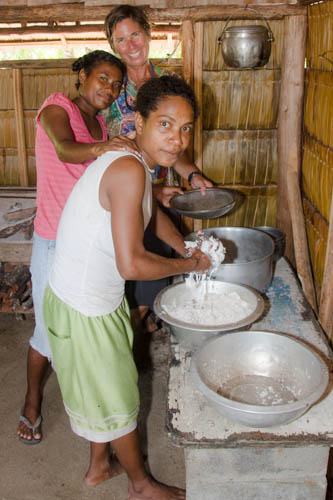
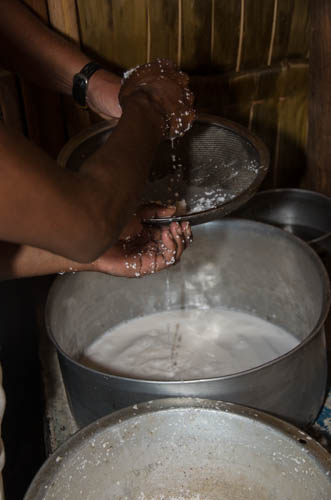
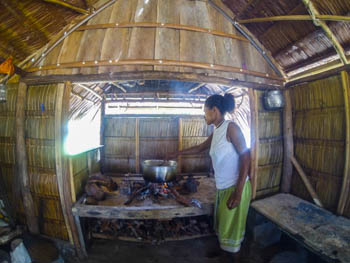

Jim only finds one inoperable Singer on Mal. Marianne has taken excellent care of her handcrank sewing machine and he has it humming along in no time.
Thomas shows Jim the solar panels from the buoy he's found. He has already wired it correctly but isn't sure how to proceed. Jim brings in his multimeter and checks the voltage/amperage output. It is working well enough to charge the battery which was originally sealed in epoxy. Out of curiosity, Thomas and Richard have chopped it out. They connect it and the battery begins charging. Thomas likes the multimeter. "Is toy" uttered the Eastern European electrician working on our VHF radio in New Zealand when he saw it. Jim was embarassed so bought a professional one. Thomas gets to keep the toy.
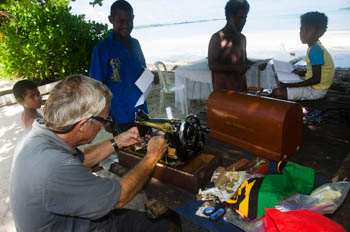
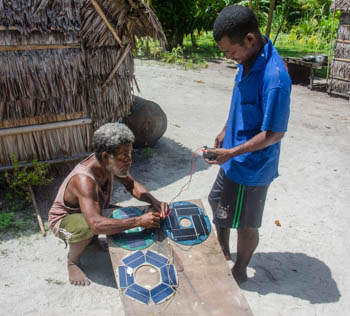
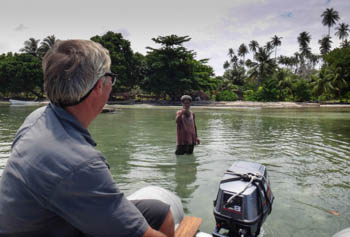



Chris and Ivan paddle out to Tenaya to see if we want any of the fish they've just caught. We are weary from a long, hot day and don't feel like cooking so we decline. We ask if they would like some fish hooks. Yes, they would. They come aboard, have a tour, Jim takes their pictures and we print a photo for each. As they leave I notice their paddles. They are carved! I ask to photograph them. "Would you like one?" Ivan asks. "Oh yes!" Jim and I both exclaim. "I will give you one on Sunday."
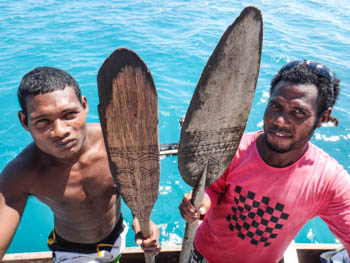
Leopard greets us when we arrive on Sunday and helps us haul the dinghy onto the beach. "Leopard, that is a great name," I say. "It is an animal that lives in Africa," he says. A different Chris comes up, Chris Omen. He is the headmaster of Lau/Mal Primary School. He says Ivan is sailing in his wa but there is someone else we can get a paddle from. He already knows we want one.
Chris leads us down a perfectly cleared path to the village. A crowd begins to gather. A young man walks out of a house carrying a carved paddle and hands it to me. It's lovely and has never been used. I ask if this is Ivan's. No he says, but you can have it. Okay. Jim asks if he carved it. No, Carl did. He points to an old man sitting cross-legged on the grass. His eyes are coated over with cataracts and there is a hole in his right earlobe the size of a quarter.
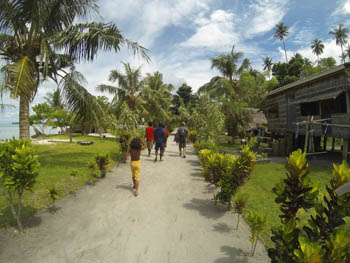

Because there is no trading here we give the man that gave us the paddle a handcrank flashlight and a bag of three-in-one cappuccino packs. They love coffee here! We hand him bags of rice and sugar and ask that he gives one to Ivan for introducing us. To Carl we give a solar light. At some point another man gives Jim and me each a hat. Mine fits but Jim's isn't even close and we all laugh. I take a picture and hand it back saying, "Kemulik wanen." Thank you very much.
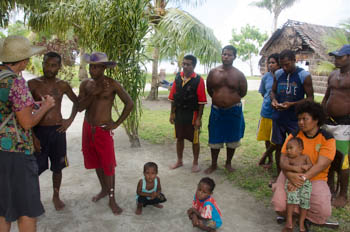
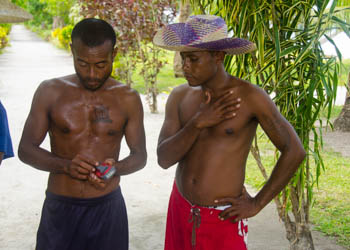
Chris Omen comes out to Tenaya with his daughter, Stalina and a boy named Peter. Stalina's finger is bleeding. She tried to pet the green turtle Chris has just speared. A little polysporin and a waterproof band-aid fix her right up. It breaks my heart to see the turtle wedged into the canoe struggling weakly with blood trickling down its neck. The shell is beautiful. There is not a bit of growth on it.
Jim and I find it hard to align our feelings for conservation with the needs of local populations. There are plenty of green turtles and coconut crabs here and very few people. They kill only what they need and nothing goes to waste. Who are we to say they should not eat these creatures? We have a locker loaded with tinned chicken and meat. They do not.
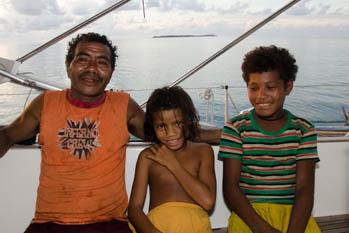
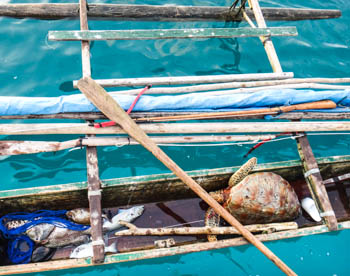
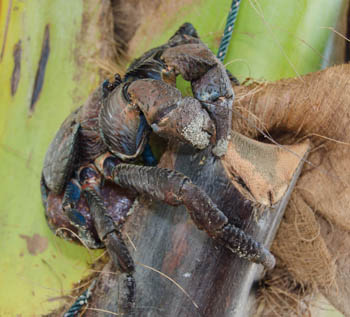
Chris gives us a copy of the Seimat-English picture dictionary. Among many translations, it has eight words for different types of waves as well as words for each of the points of sail. Aupolun heixam is 'a very good wind for canoe racing,' a beam reach.
Summer Institute of Languages (SIL) has published this wonderful dictionary. It is a faith-based non-profit organization that has researched 389 of the over 800 languages in PNG. 800 languages! There are 7105 known living languages and PNG has over 10% of them! This organization believes that "...languages and cultures are part of the richness of God's creation," and "limits its focus of service to language development work. SIL does not engage in proselytism, establish churches or publish Scriptures."

In the short time we are at Mal we grow very fond of the people we've met. They are kind, bright, hospitable and generous. We like this place very much and wish we could spend more time here. Our new friends give us presents of coconut crab shells, hats, bananas, lemons, lemon grass, a pumpkin and coconut oil and we give them gifts of onions, garlic, salt, chocolate cake, a sharpening stone and a photo album filled with pictures of our time together.
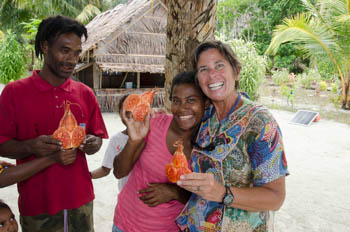
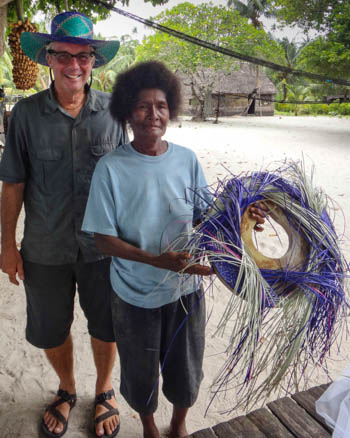

Each day Elizabeth makes us lunch. One day she prepares cassava and bananas that are delicious. I ask her secret. She says to grate the cassava and let it dry first. Then squeeze the coconut shavings to make milk and mix it with the cassava. Roll it into balls and drop them into boiling water and coconut water. Cooking bananas can be dropped in first in desired. The day we leave she prepares this again along with fried cassava balls. I am happy to have this hearty, yummy food for our passage.
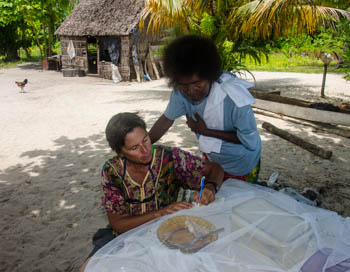

It is very sad when we have to leave, but the weather looks good to head for Palau. The ladies prepare a wonderful send off meal and, as usual, Jim and I eat alone as they watch. We devour succulent flavorful fish, juicy roasted chicken and sweet cassava and bananas in coconut milk.
Just before we are ready to leave Thomas brings Elizabeth and Silvester, Lucy, Judy and baby Elizabeth, Mollina, Westley and Finn out to shake our hands good-bye. Many of us have tears in our eyes. Thomas and Judy give us sincere, heartfelt letters to read once we are on our way. Thomas ends his with "May God bless and protect you from any danger and sudden death on your destination."
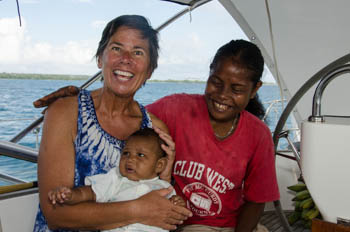
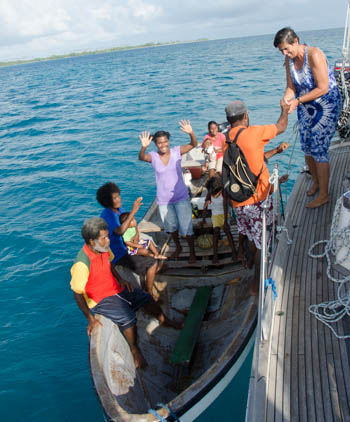
If any yachts are coming this way, Elizabeth needs a few colors of dye for pandanus leaves to make hats and Westley needs snorkeling gear. Everyone needs clothes and most love salt and coffee. Sugar, flour and rice will also be appreciated.
Go to September 2013 Part 4 - Sailing Canoes in Ninigo, Papua New Guinea
"
